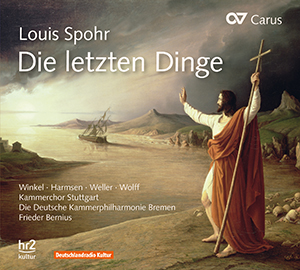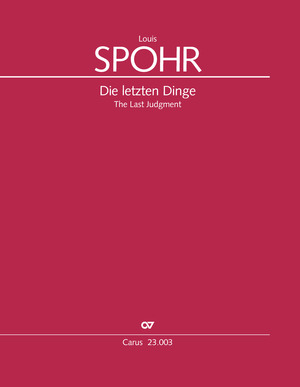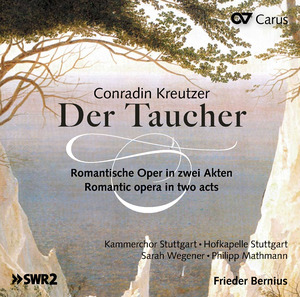
Louis Spohr's oratorio The Last Judgment is one of his most successful works and one of the most important contributions to the literature of the oratorio. The text is based on selected passages from Revelation in the New Testament, whose visions of death and eternity Spohr set most vividly in music. The work impresses through its masterful instrumentation, its careful, stunning use of chromaticism, its large-designed solo recitatives and, likewise, through the imposing choral movements, with their fervent, emotional and stirring dramatic content. Like no other ensemble, with this group of elite soloists, the Kammerchor Stuttgart and Die Deutsche Philharmonie Bremen, Frieder Bernius aptly succeeds in bringing to light the many facets of this dramatic oratorio.
Awarded the Preis der deutschen Schallplattenkritik
Contents
-
Composer
Louis Spohr
| 1784-1859Louis Spohr, geb. 1784 in Braunschweig, gest. 1859 in Kassel. Galt als einer der besten Violinisten, Dirigenten und Komponisten seiner Zeit. Er erhielt Violinunterricht seit seinem fünften Lebensjahr. Bereits 1799 Geiger in der Braunschweiger Hofkapelle, dann Konzertmeister in Gotha; 1812 – 1815 Kapellmeister in Wien; ab 1822 Hofkapellmeister in Kassel, empfohlen von C. M. v. Weber. Ausgedehnte Konzertreisen brachten ihn u. a. mit N. Paganini zusammen. Er hinterließ über 200 Werke, darunter viele A-cappella-Chöre. Sein Oratorium "Die letzten Dinge" (1826) wurde im 19. Jahrhundert hoch geschätzt. Personal details
-
Preface writer
Dieter Zeh
| 1942
-
Choir
Kammerchor Stuttgart
The Kammerchor Stuttgart is regarded as one of the best ensembles of its kind. Over its fifty-year existence, Frieder Bernius has developed the choir into an exceptional ensemble acclaimed by audiences and press alike. This has led to invitations for the choir to perform at all the important European festivals. In Germany the chamber choir performs at festivals and in concert halls in repertoire ranging from the 17th to the 21st century. Frieder Bernius and his ensemble have received numerous accolades for their contribution to new music. The Kammerchor Stuttgart has made over 80 CDs and LPs, numerous of which have been awarded international recording prizes (including the Edison award, Diapason d’or, Gramophone Choice, Classical Internet Award, International Classical Music Award, and German Record Critics’ Award prizes). The International Federation for Choral Music has invited the ensemble to sing at the 1st, 4th and 10th World Symposia on Choral Music in Vienna, Sydney and Seoul. Regular tours of North America and Asia since 1988 and a South America tour reflect the Kammerchor Stuttgart’s international reputation. Since 1984 the top ensemble has also been invited to Israel biennially. Personal details
-
Ensemble
Die Deutsche Kammerphilharmonie Bremen
The Deutsche Kammerphilharmonie Bremen is one of the world's leading orchestras, captivating audiences everywhere with its unique style of music-making. The Estonian conductor Paavo Järvi has been the orchestra's Artistic Director since 2004.
One of the many highlights of the collaboration with Paavo Järvi has been their Beethoven Project, on which conductor and orchestra concentrated for six years. Their Beethoven interpretations have been acclaimed worldwide by audiences and critics alike as benchmark performances. Following the Beethoven Project The Deutsche Kammerphilharmonie Bremen and Paavo Järvi focused on Robert Schumann's symphonic works with equal success.
The latest project of the orchestra and its conductor is the German composer Johannes Brahms. The first CD (Sony/RCA) of the project – Symphony No. 2, Tragic Ouverture and the Academic Festi-val Ouverture – was released in autumn 2017 and received the Opus Klassik in October 2018. The second CD, including Symphony No. 1 and the Haydn-Variations, followed in autumn 2018. With the third and fourth Symphony, released in March 2019, the symphony cycle has come to completion.
Highlight of the project was the internationally acclaimed performance of ›A German Requiem‹ on the 10th of April 2018 at Bremen Cathedral, 150 years after the first performance. The recording has now been released on DVD and Blu-ray by C-Major. In October 2019, ›The Brahms Code‹ – an excit-ing TV/DVD documentary about the Brahms Project produced by Deutsche Welle/Unitel – was re-leased and is the current German Record Critics' Award winner in the category music film (listed 1/20).
The Deutsche Kammerphilharmonie Bremen has been honoured with countless prizes such as Echo, Opus and Diapason d'Or for its recordings and the unique education project with the Gesamtschule Bremen-Ost in Osterholz-Tenever, the Zukunftslabor. For years, the orchestra has cultivated close musical friendships with international soloists such as Christian Tetzlaff, Maria João Pires, Janine Jansen, Igor Levit, Hilary Hahn and Martin Grubinger.
The Deutsche Kammerphilharmonie Bremen is permanent guest orchestra at the Elbphilharmonie Hamburg and Festival Orchestra of Kissinger Sommer. Personal details
-
Conductor
Frieder Bernius
| 1947Frieder Bernius’s work has earned great worldwide recognition. He is in demand internationally as a conductor and as a teacher. His principal artistic collaborators are the ensembles he founded himself, the Kammerchor Stuttgart, the Barockorchester Stuttgart, the Hofkapelle Stuttgart and the Klassische Philharmonie Stuttgart. As a guest conductor, he has collaborated repeatedly with, for example, the SWR Vokalensemble Stuttgart, the Deutsche Kammerphilharmonie Bremen, the Stuttgarter Kammerorchester and the Streicherakademie Bozen. Great stylistic versatility is Frieder Bernius’s hallmark. Whether he conducts vocal works by Monteverdi, Bach, Händel, Mozart, Beethoven, Fauré and Ligeti, stage music by Mendelssohn or symphonies by Haydn, Burgmüller and Schubert, his work always aims for a sound that is at once unmistakably personal and at the same time oriented towards the original period sound ideal. He devotes himself equally to the rediscovery of 18th century operas and to first performances of contemporary compositions. He is particularly interested in the musical history of southwestern Germany. Carus-Verlag has awarded Frieder Bernius a Golden CD for his complete recording of the sacred music of Felix Mendelssohn Bartholdy. The award was presented to him during the German Choir Festival in Stuttgart 2016. The sale of over 250,000 recordings, which has been acclaimed with a number of awards, has made a not insignificant contribution to what today is the obvious presence of Mendelssohn's complete œuvre in the concert repertoire. Personal details
-
Soloist - soprano
Johanna Winkel
Johanna Winkel studied singing with Mechthild Böhme and Caroline Thomas, and attended master classes to augment her education. She gave her international debut in 2008 with Peter Neumann and the Concerto Köln in Nantes. She subsequently performed with, among others, the Hamburg Symphony Orchestra, the SWR Vokalensemble Stuttgart and the SWR Symphony Orchestra as well as the NDR Choir. She has sung, for example, at the Musikfest Berlin, the Lucerne Festival and La Folle Journée. Johanna Winkel has won several prizes for opera singing and was awarded first prize in the Cantilena Singing Competition in Bayreuth. Johanna Winkel has performed various operatic roles in historical performance locations such as the Margravial Opera House in Bayreuth and the Ekhof Theater in Gotha. She can be heard on many live recordings as well as on a number of CD recordings. Personal details
-
Soloist - alto
Sophie Harmsen
-
Soloist - tenor
Andreas Weller
-
Soloist - bass
Konstantin Wolff
Konstantin Wolff studied with Donald Litaker at the Hochschule für Musik in Karlsruhe. He won the Felix Mendelssohn Bartholdy Prize from the Stiftung Preußischer Kulturbesitz, was awarded a scholarship by the German National Academic Foundation and made his opera debut in 2005 at the Opera National de Lyon under William Christie in Monteverdi’s L’incoronazione di Poppea. His concert repertoire ranges from the early baroque to the 20th century. He has performed with conductors including Gerd Albrecht, Alun Francis, Riccardo Chailly, Ton Koopman, René Jacobs, Claudio Abbado, Sir Simon Rattle and Nicholas McGegan. His first solo CD, a recording of Lieder to texts by Victor Hugo, has been enthusiastically received. Personal details
Reviews
Spohr: Die letzten Dinge
Das ganze Oratorium hält sich von aller unpassender Opernhaftigkeit fern ... und schüttet ein Füllhorn feinster Melodien aus.
Johannes Mundry, blick in die kirche, September 2018
![]()
Bernius und sein Ensemble musizieren diese Wiederentdeckung absolut berückend ...
Gustav Danzinger, CHOR aktuell, 03.2015
Assurément la version de référence pour cette œuvre attachante, à connaître pour les amateurs de Mendelssohn et, plus largement, pour se délecter de l’art si subtil du magicien Bernius.
(Sicher die Referenzaufnahme für dieses fesselnde Werk, für die Mendelssohnliebhaber zum Kennenlernen und mehr noch, um sich an der subtilen Kunst des Magiers Bernius zu ergötzen.)
Florent Coudeyrat, concertonet 19. Februar 2015
Ce qui frappe tout d’abord, c’est l’exceptionnelle qualité du chœur: homogénéité des pupitres, unité d’intention, couleurs particulièrement soignées, très grande précision dans les détails, des attaques parfaites, on a là affaire à un phalange particulièrement en forme et à un chef remarquablement inspiré.
(Als Erstes fällt die außerordentliche Qualität des Chors auf: Homogenität der Stimmen, ein einheitlicher Wille, besonders sorgfältig hervorgehobene Klangfarben, große Präzision in den Details, perfekte Einsätze. Man hat hier mit Gruppe zu tun, die besonders gut in Form ist, und einem Dirigenten, der sich sehr inspiriert zeigt.)
Claude Jottrand, forumopera 4. Februar 2015
… wird [Spohr] sein Werk nie überzeugender gehört haben, als es uns jetzt auf CD vorliegt!
Astrid Belscher, kulturradio rbb Tipps, Bücher für den Winter 2014/15
Besser kann man diese Musik nicht aufführen.
Dorothea Bossert, SWR2 Cluster 16.10.2014, CD-Tipp
Es gelingt ein ganz wunderbarer Wechsel von lyrischen und hochdramatischen Passagen - bei höchster Spiel- und Klangkultur.
Die Rheinpfalz, 31. Oktober 2014
Frieder Bernius und sein exzellenter Kammerchor Stuttgart folgen mit schlackenloser Klarheit den vorgezeichneten Klangwegen ins milde Licht der Ewigkeit: ohne nazarenerhafte Süße, aber mit souverän disponiertem dramaturgischem Bogen, vom Spirituell-Verhaltenen bis hin zu den Momenten gesteigerter Intensität […]
Vierteljahrespreis der deutschen Schallplattenkritik, Bestenliste 4-2014
… [Frieder Bernius] parvient à obtenir de ses troupes l'absence d'afféterie que visait le compositeur ainsi qu'une luminosité qui rendent sa musique profondément éloquente et émouvante, parfois presque réconfortante.
(… es gelingt Frieder Bernius, mit dieser exzellenten Besetzung eine leuchtende Musik, zutiefst redegewandt und ergreifend, jedoch ohne Manieriertheit umzusetzen.)
Jean-Christophe Pucek, passee-des-arts.com, 26. Oktober 2014
Hier stimmt einfach alles: von den Tempi bis zur Akustik. Bernius at his best.
Michael Kube, nmz, November 2014
… eine neue Referenzaufnahme eines viel zu unbekannten Werkes.
Nike Keisinger, SR 2 - MusikWelt, 23. September 2014
Frequent questions about this work
 There are no questions and answers available so far or you were unable to find an answer to your specific question about this work? Then click here and send your specific questions to our Customer Services!
There are no questions and answers available so far or you were unable to find an answer to your specific question about this work? Then click here and send your specific questions to our Customer Services!







